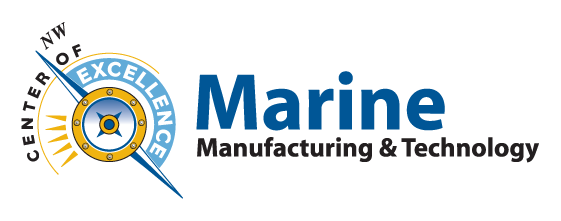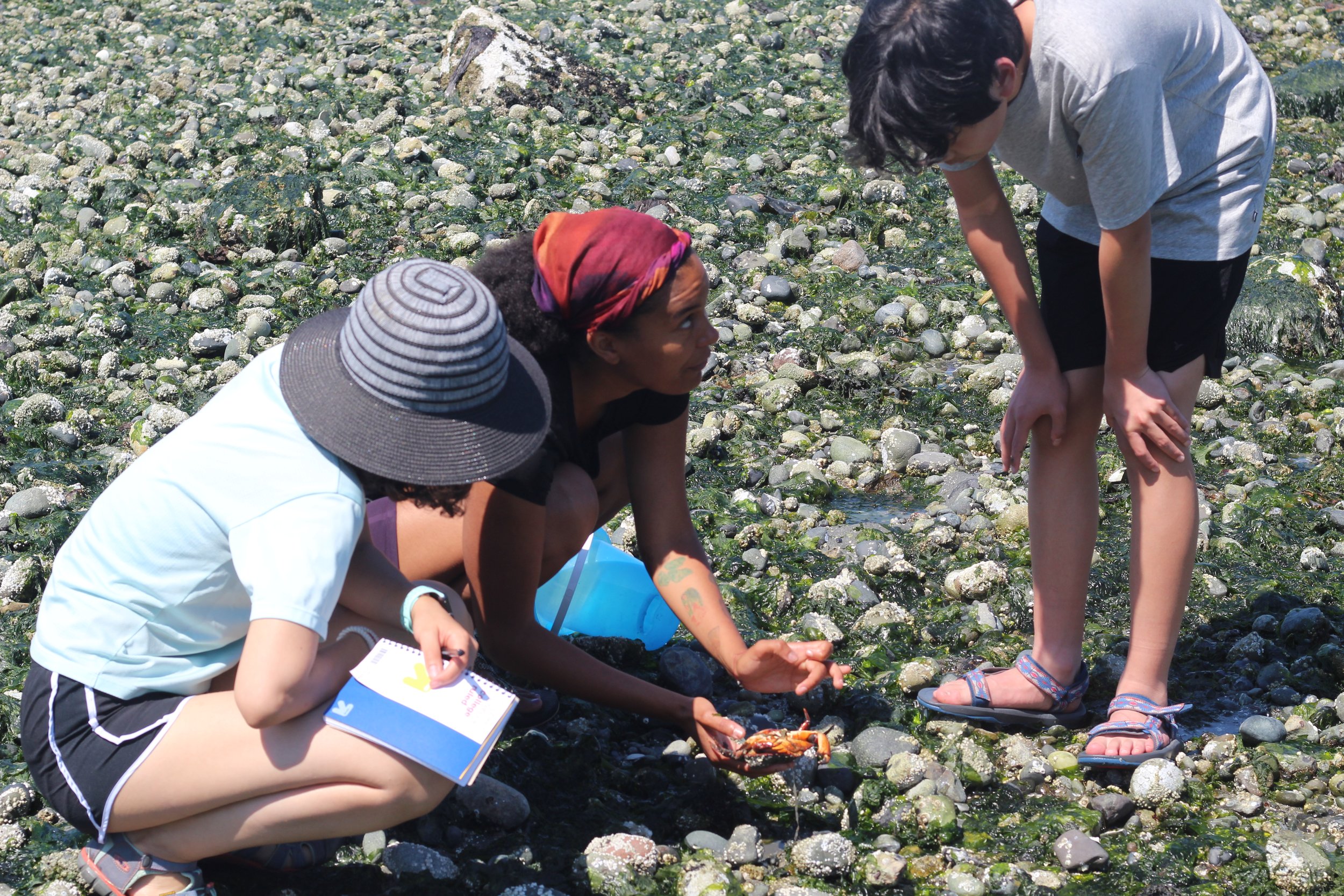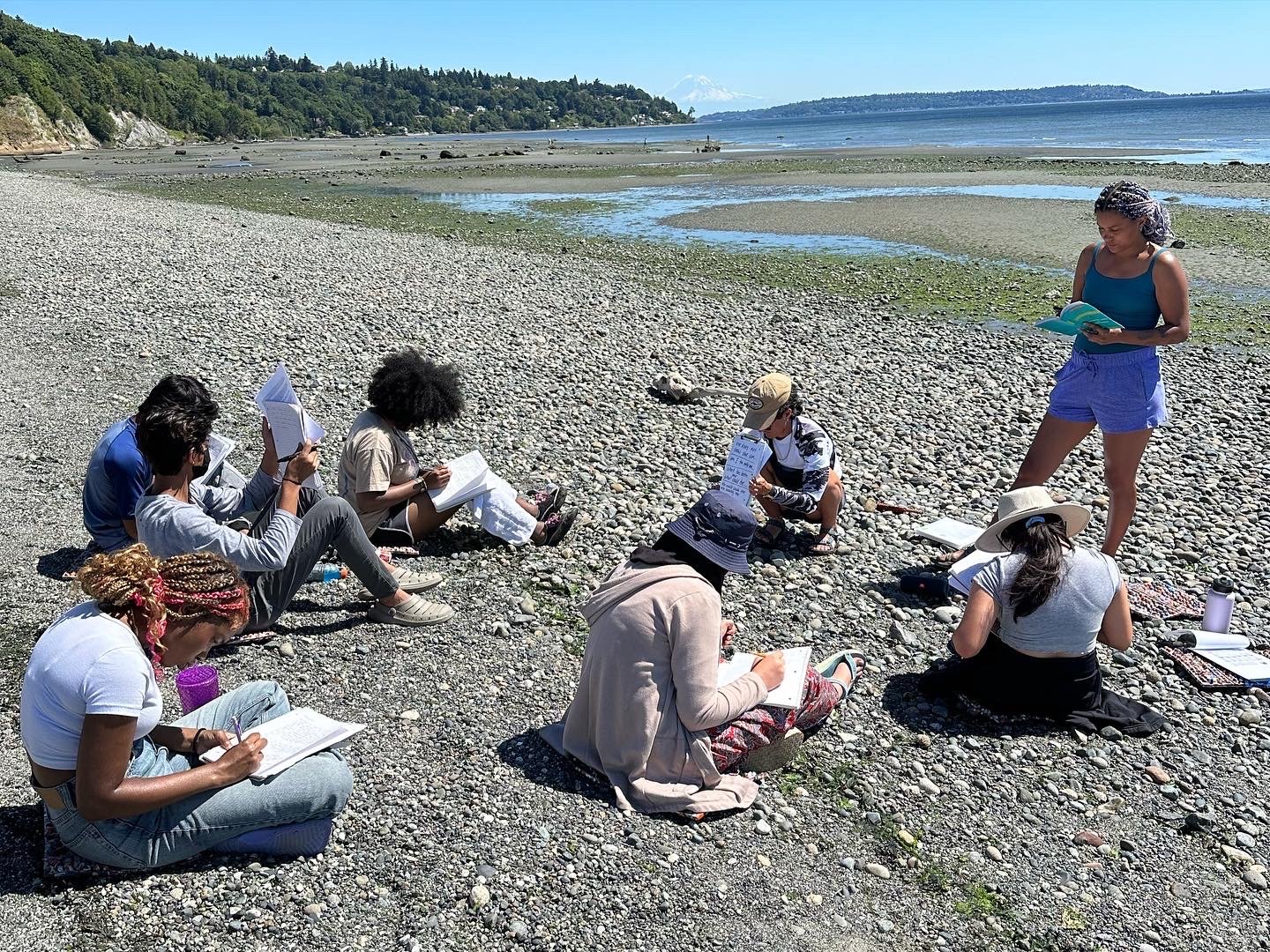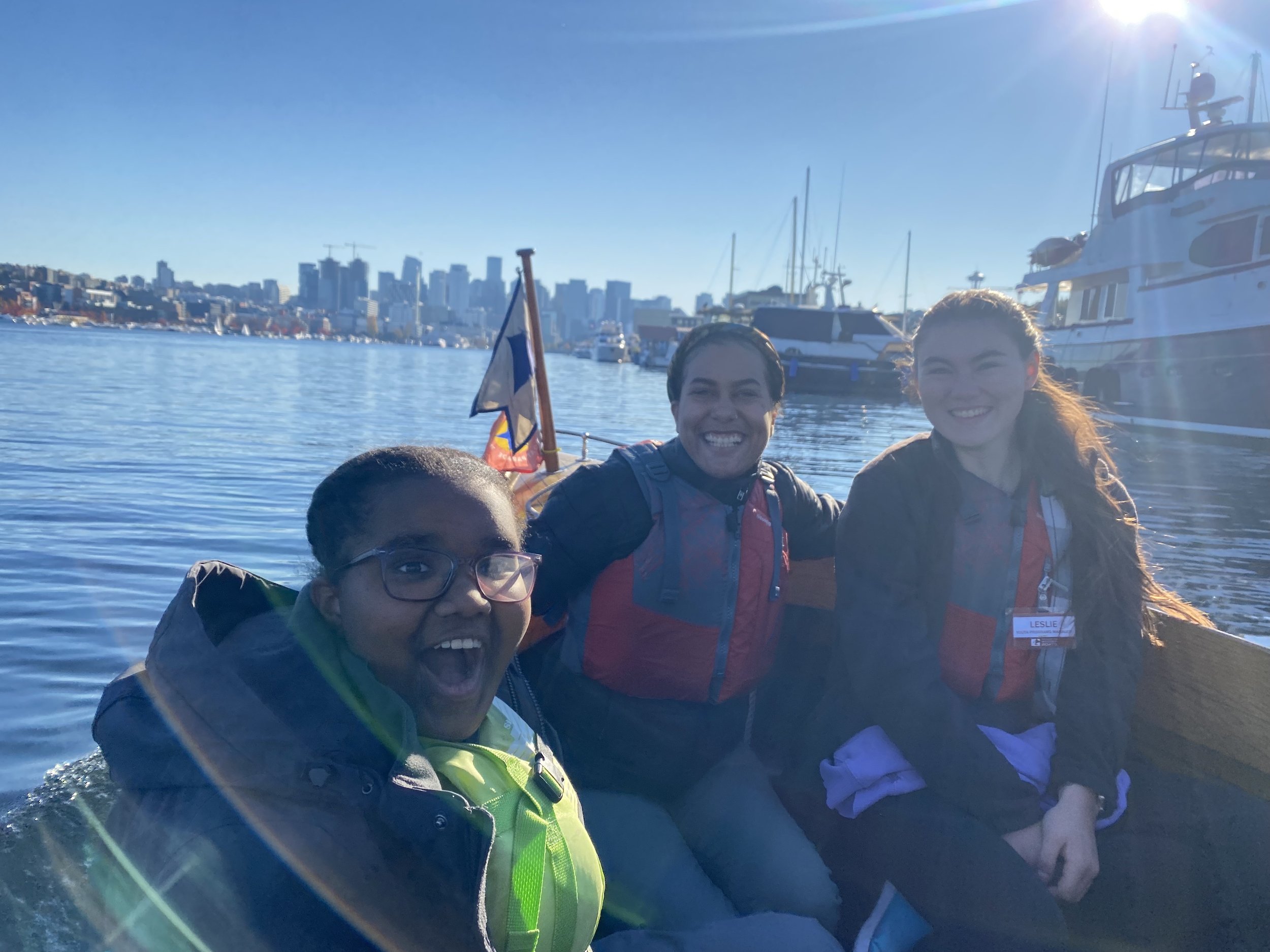Rebuilding the Maritime Workforce Through Mentorship
By Savannah Smith edited by Ebony Welborn, Sea Potential
Ocean's Healing Hands Tidepooling
Who comes to mind If I ask you to name someone who has been pivotal to your career trajectory and success?
What about that person sticks out to you?
If no one came to mind for you, do you wish you would’ve had someone like that along your journey so far?
As you grow into potentially becoming a pivotal person in someone else’s career journey, how do you think you should be showing up?
Collaborative relationships in which a seasoned professional shares their knowledge, experience, insights, and resources with a less experienced individual, is known as mentorship. It’s not a new concept, but I do think it is something that isn’t talked about enough. In a very basic and informal way, mentorship has shown up through employee referrals for generations. If you haven’t referred or been referred to a job by someone before, I’m sure you at least know someone who has been. I view referrals as being closely linked to mentorship, especially when coming from friends and family, because people are more likely to invest in the success of people they refer. Partially for their own reputations sake, but also partially due to the personal relationship and care between the individuals. When you know someone personally, you know what opportunities could be a good fit for them. Think about it in the context of phrases like “This job would be perfect for you!”, or “Just apply, I’ll put in a good word for you!” or “Don’t worry, I’ll show you the ropes once you get the job”. To me phrases like these reflect that people put thought into their referrals and demonstrate some form of commitment to the person they refer. This type of foundation of support and positive personal relationship between individuals can help them identify and create opportunities for one another as well as overcome challenges along the way.
Referrals in general have actually been so successful that 88% of employers rate them as having the best ROI (Return On Investment) for sourcing employees. Referred employees also stay 70% longer than employees acquired through job boards, with a retention rate rising as high as 122% for smaller companies. To me, these statistics reveal that there is likely something deeper than just the referral itself contributing to this trend and I believe it correlates to themes found in mentorship. Would those people have found that job or stayed as long without the support of the person who referred them playing a factor?
When it comes to mentorship in general, it's no secret that it contributes to the success of individuals and businesses. In fact, 84% of U.S. Fortune 500 companies have mentoring programs and this number only gets higher as you move from Fortune 500 - Fortune 50. This probably has to do with the fact that many successful people have had a mentor themselves at some point. Out of 1,348 CEOs surveyed by Vistage in 2020, 86% agreed that mentors were a crucial part of their career accomplishments.
I make this point about the importance of mentorship as it relates to referrals because in the maritime industry in particular, there has been a long history of word of mouth career connections. However, the traditional pattern of referrals and word of mouth job advertisement hasn’t been proving to be as successful in recent years. The industry can’t afford to only pull from the pools of people they’ve always been referring; that pool is smaller than the pool necessary to keep the industry afloat. Not to mention, it has limited how the industry can thrive from the beginning. Our maritime industry desperately needs to foster new relationships. With the current threat of an aging fleet of workers retiring out at rates faster than they are being replaced, it’s important for us to think about how we can expand on personal referrals. By focusing on the deeper theme of mentorship, we can support individuals who will become the future of the workforce and particularly those who do not already have obvious maritime connections or strong ties to the industry. Simple referrals and word of mouth advertising isn’t enough for individuals and communities that have been ostracized from the industry. BIPOC communities in particular have been gatekept from maritime careers in our region for generations. As we always put it, there is a lack of awareness of opportunities more than there is a lack of interest. I believe mentorship should more intentionally become the prerequisite to referrals, and continue to be built upon following the hiring process.
Photo courtesy of Sea Potential, LLC. Fall-Winter 2022 Get Into It: Maritime! cohort on a Washington State Ferry ride and behind the scenes tour
Mentorship is a relationship that extends beyond simply offering advice, it relies on cultivating a personal relationship to help the mentee develop the skills necessary to excel in their chosen career path. This means helping them cultivate skills that you yourself have and can share , but also helping them identify and hone the skills they have to begin with. In doing so, you will be able to learn from them along the way as well. Demonstration and simply providing the answers isn’t the only approach that should be taken when cultivating skills either. We see it all the time with our youth participants that they really excel when you also include the how and the reasoning behind the process. This makes sense considering that a lot of our ancestral knowledge across cultures has been shared and passed down in the form of stories and the personalized experience of learning in community. With efforts like the development of the Washington Maritime Careers website by NW Center of Excellence for Marine Manufacturing & Technology, the local industry is taking the right steps in making information on maritime careers more accessible and digestible. But in an industry like maritime where practical knowledge and real-world experience hold immense value, mentorship can make all the difference in inspiring the next generation and shaping their real world experiences into a successful career trajectory. There are a few key ways I see mentorship helping to build up the next generation of mariners and transform the industry:
Career Selection
As many of you reading this may already know, there is an overwhelming amount of opportunity in maritime! With such a large variety of careers, it can be really hard to know where to start or what kinds of careers even exist. Mentors can greatly aid in this area by using their knowledge of the industry as well as their understanding of their mentees skills, passions, and strengths, to help recommend careers and identify pathways. Personally, I decided that I was going to be a Marine Biologist when I was in the second grade because a family friend/teacher noticed that I had an interest in sea life and told me that I could turn that passion into a job one day. I don’t know what would’ve come out of that early interest of mine if I didn’t have someone share that information with me and encourage me that it could be a good fit.
Photo courtesy of Sea Potential, LLC. Between The Tides Summer 2023 cohort doing a guided journaling activity at Discovery Park Beach
In addition to helping mentees see the connection between themselves and particular careers, mentors can also serve as resources when it comes to networking. As seasoned professionals, mentors have spent time getting to know others in the industry and can make strategic introductions for their mentees. Their access to a network of other professionals also makes it easier for them to provide relevant and tailored answers to their mentees questions. Direct relationships with others who hold knowledge can prove to be far more informative and efficient than scouring the internet. For mentees who may be entering a new career field or who have less experience, mentors can also shed light on questions they haven’t even thought to ask prior. You don’t know what you don’t know, and mentors are great for helping you learn those things sooner.
Career Advancement
Mentorship should extend past the hiring process because careers don’t end with selection. Once you enter a specific career you will then be faced with opportunities to grow and advance. As individuals progress in their maritime careers, they encounter new hurdles that demand strategic thinking and adaptability. A mentor, having traversed similar obstacles, can offer personalized advice and solutions. Mentors can help mentees avoid common pitfalls and share insights that only years of experience or industry context could provide. Having spent time in the industry for years prior, mentors will also be aware of trainings, conferences, certifications, and so on, that could serve as self-edification tools, career advancement accelerators, and networking opportunities for their mentee.
The industry itself is also going through rapid and complex change that requires nuanced understanding of industry dynamics. This is where mentorship becomes a compass, guiding professionals through the storms of change. Mentors may even be better prepared for changes themselves compared to their peers, considering they may be more keen to notice changes in order to best support their mentees. Building on that, mentors can foster their own career advancement through their role. Being a mentor requires you to reinforce your own knowledge by exercising your brain and skills. A mentorship role also provides an opportunity to gain more leadership experience and potentially practice skills such as cross cultural communication or intergenerational communication.
Personal and Professional Growth
At the end of the day, mentorship in the form we are talking about can’t really be separated between career and individual because it derives from a person-first approach. Some skills are hard to teach simply through demonstration or out of context advice. Some growth really only comes through personal relationships and consistent support. For example, the maritime industry demands qualities such as leadership, communication, and decision-making under pressure. Those aren’t skills you can just take in a one and done crash course. A mentor, through one-on-one interactions and constructive feedback, can nurture these essential soft skills. Mentors can also serve as accountability partners that push their mentees to continue growing personally and professionally. With this dynamic being so relational, a positive mentorship experience should cultivate a safe space for seeking support as well. The authenticity and transparency of the mentor on their own experiences is a key element contributing to the development of this kind of safe space. This is especially important for careers that are linked to feelings of isolation or have impacted mental health. For example, being away at sea for long voyages can be hard on people; a mentor could help prepare mentees for that situation and support them before, during, and after. Going into a situation like that without proper awareness or resources could be detrimental.
As for the mentor, you never know what you may learn! The best mentors take their ego out of it and realize that the mentee isn’t the only one in a learning experience. Mentorship is not meant to be something you do to inflate your sense of self, boast your position, or overwhelm people with your knowledge. Mentorship thrives in genuine reciprocity. Mentors may learn directly from the knowledge, advice, and experiences shared by their mentees as well. Their growth may also show up in self reflection. A mentorship role allows people to reflect on things like their current job satisfaction, impact, and the lessons of their past experiences.
Photo courtesy of Sea Potential, LLC.
GIM Steamboat - Fall-Winter 2022 Get Into It: Maritime! cohort on a steamboat ride in Lake Union with The Center for Wooden Boats
Workforce Sustainability
A culture of mentorship will overall contribute to the long term success and sustainability of the industry. Research has shown that 89% of people who have been mentored will go on to be mentors themselves in the future. This perpetuates a cycle of knowledge sharing, industry growth, and excellence. Employees will be onboarded faster, retained longer, feel better in their roles, and likely contribute to more industry growth. Mentorship thus becomes a means of preserving industry standards while fostering innovation and adaptation.
In an industry as intricate and demanding as maritime, mentorship stands as a lighthouse guiding aspiring professionals through the challenges and opportunities that come their way. Mentorship is a reciprocal relationship that provides many benefits to the mentee and mentor as individuals, but also to the industry as a whole.
To all the maritime employers: How are you supporting employees in taking on mentorship opportunities? Are you developing any mentorship programs within your company? Employers can show support by paying their employees to be a part of external mentorship programs and even incentivising them to participate in existing internal programs. Building relationships with community organizations can be crucial as well considering that they have established relationships with individuals that you may be seeking to connect with. For example, you can reach out to us at Sea Potential! We are always seeking maritime field trip opportunities and guest speakers (especially those who identify as BIPOC, women, and/or gender expansive)
To the maritime workers: Are you making yourself visible and accessible as a resource? Have you sought out any mentorship opportunities? The maritime industry is complex and many people who aren’t in it don’t even know what it entails. I encourage current and retired maritime workers to think about how they can make the work they do more digestible and become a resource. I also encourage existing mariners to build relationships within the community. Talking to career counselors or seeking out opportunities like the Maritime High School’s mentorship program are a great place to start.
To all the potential future mariners: What steps have you taken to find a mentor? You may be surprised to find how many people are eager to support you along your journey. It never hurts to ask someone for an informational interview and you never know who may be willing to take you on as a mentee! The idea of Sea Potential was nurtured by countless people across communities who wanted to support our vision and offer their support once we started reaching out to people. Put yourself out there!
Sources:
Cantalupo, Gracey. “Does Mentoring Still Matter for Fortune 500 Companies?”. Forbes 19 May 2022 https://www.forbes.com/sites/forbescommunicationscouncil/2022/05/19/does-mentoring-still-matter-for-fortune-500-companies/?sh=2ee9a33f5d8c
Flynn, Jack. “25 Incredible Employee Referral Statistics [2023]: Facts About Employee Referrals In The U.S.” Zippia 27 February 2023 https://www.zippia.com/advice/employee-referral-statistics/#:~:text=Referred%20hires%20stay%2070%25%20longer%20than%20other%20employees.,a%20year%20and%20a%20half%20after%20being%20hired.
Galvin, Joe. “Leadership mentoring matters for CEOs”. Vistage 15 October 2020, https://www.vistage.com/research-center/personal-development/leadership-mentoring/
“Mentoring statistics in 2022: Everything you need to know”. Chartered Institute of Housing 12 January 2022 https://www.cih.org/blogs-and-articles/mentoring-statistics-in-2022-everything-you-need-to-know





